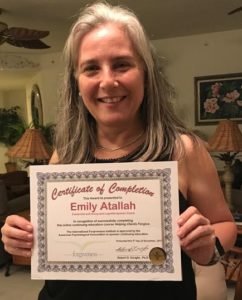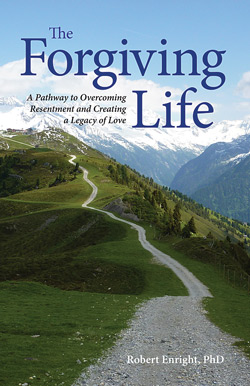Tagged: “forgiveness therapy”
Four Eye-Opening Reasons Why You Should Watch the Rome Forgiveness Conference Videos
.
.
Reason #1: To learn the importance of forgiveness education.
Dr. Robert Enright, IFI founder, first discusses what forgiveness education is and its importance for children and adolescents. Click here to watch Dr. Enright’s presentation on “The Science of Forgiveness.”.
Reason #2: To hear the surprising declarations made by a high-ranking Iraqi official about forgiveness in Islam.
.
The Iraqi Ambassador to the Vatican, Hon. Omer Ahmed Kerim Berzinji, said forgiveness plays a prominent role in his Muslim faith and that it is cited roughly 100 times in the Quran. (Click here to watch the opening part of his presentation, which includes a consecutive translation of his Arabic words. After this brief consecutive translation, the rest of the ambassador’s talk is in Arabic without the translation). The Hon. Berzinji expressed an interest in considering the implementation of forgiveness education in Iraq.
Reason #3: To hear for yourself the Orthodox Jewish speaker’s views on forgiveness.
Peta
Peta Pellach of the Elijah Interfaith Institute in Jerusalem gave an inspiring presentation of forgiveness in Judaism that is not to be missed. Click here to watch Ms. Pellach’s presentation.
.
Reason #4: To hear for yourself the Christian speaker’s views on forgiveness..
Monsignor Mariano Fazio, Vicar General of Opus Dei and a long-time personal friend of Pope Francis, discusses his views on forgiveness. Click here to watch Msgr. Fazio’s presentation. Author of more than 20 books, Msgr. Fazio’s newest book is titled Pope Francis: Keys to His Thought.
We extend our thanks and appreciation to our conference partner Forgive4Peace for helping us make it possible.
Emily Atallah
Through my work as an existential logotherapeutic coach, I help people find meaning in everything in their life, including work, family relationships, and in situations where they face insurmountable suffering. I do this mainly by working with the power of forgiveness.
In my home country, Colombia, forgiveness seems like an impossible task for many. With a history of more than 60 years marked by war, drug trafficking and constant conflict, entire populations have now had to confront a hard question: will they forgive those who horribly hurt them even if they never asked for forgiveness?
This made me look for ways I could help those clients who had to leave their home behind, fearing for their safety, and who came to a city that in more than one occasion, receives them with a hostile environment and not much help. Many people with deep wounds derived from the conflict and a past of violence, resentment and vengeance.
As I looked for ways to help, I researched many therapies, but with time, I found them temporary or incomplete. I also looked into the initiatives of religious groups, and though they were having some admirable results, they did not appeal to non-believers.
Then I heard about the International Forgiveness Institute, and all their research on how forgiveness is a psychological matter, not only a religious one. I was personally impressed by their focus on forgiveness’ impact on psychological issues such as anxiety, depression, and others as measurable variables. For me, it meant that now we can present evidence that forgiveness works and can in fact change hearts!
Finding meaning and forgiveness in a life full of resentments is crucial to heal. To see the offender as a human being and giving them what they deserve in dignity and love, changes your life and theirs. It restores justice even without reconciliation.

Emily Atallah with her Forgiveness CE Course Certificate of Completion.
Forgiveness gives you a second chance for a meaningful and happy life, an opportunity to live a better, healthier, fulfilling life where people reach for their dreams without the weight of resentful thoughts.
As a life coach, I found particularly reassuring and helpful to learn that forgiveness has a measurable impact on the people I treat despite what the offense was. My time studying at the Forgiveness Institute gave me more tools to better treat my clients, to measure their progress and to encourage them to strive for a better and more meaningful life.
I encourage you to give yourself the opportunity to see forgiveness in a new light and learn about its healing power, by taking the online “Forgiveness Therapy” course through the International Forgiveness Institute.
Emily Atallah
Coach de Vida
e-mail: emilyatallah@gmail.com
www.emilyatallah.com
I recently read an article about “50 children under the care of the state were victims of substantiated sexual abuse.” I’m tired of reading about the sex abuse happening in our society. Is there a connection to anger, lack of forgiveness to sex offenders? If there is a connection what about forgiveness therapy for sex offenders; can it help in lowering the chance of re-offending? If so, can forgiveness therapy/curriculum in schools, anger management programs, prisons etc possibly lower the incidences of sex abuse?
Should I Forgive?
Excerpt from pages 37-38 of the book, The Forgiving Life by Dr. Robert Enright:
.
 Nietzsche said that only the weak forgive. In other words, if you have to keep a job, then you forgive. If you find another job, then you can boldly tell that boss where he can go as you strut out the door. Yet, is this philosopher Nietzsche talking about genuine forgiveness? I don’t think so.
Nietzsche said that only the weak forgive. In other words, if you have to keep a job, then you forgive. If you find another job, then you can boldly tell that boss where he can go as you strut out the door. Yet, is this philosopher Nietzsche talking about genuine forgiveness? I don’t think so.Why Resentment Lasts—and How to Defeat It
 Editor’s Note: As a regular blog contributor to the online version of Psychology Today, Dr. Robert Enright (founder of the International Forgiveness Institute) has repeatedly received special recognition for his posts. Yesterday, his latest blog was given “Essential Topic” status meaning that it receives prominent placement on their website along with being featured on the first page of blog topics like“Education” and “Therapy.” Here is that blog:
Editor’s Note: As a regular blog contributor to the online version of Psychology Today, Dr. Robert Enright (founder of the International Forgiveness Institute) has repeatedly received special recognition for his posts. Yesterday, his latest blog was given “Essential Topic” status meaning that it receives prominent placement on their website along with being featured on the first page of blog topics like“Education” and “Therapy.” Here is that blog:
Posted March 25, 2017 – Psychology Today
Let us keep the philosopher’s resentment and let us banish the other.
Yet, the psychologist’s kind of resentment all too often is not a polite guest. It seems to never know when to leave. In fact, if left unchecked it can take over the psychological house within you. Why is this? Consider three reasons.
First, we have all felt the initial euphoria created by a response of courage after another’s offense. We will stand up for ourselves. We will resist. Resentment can give you a feeling not only of euphoria but also of strength. Nurturing such a rewarding feeling can become a habit. I know of one person who, upon having his morning cup of coffee, would replay the injustice and feel the inner strength as a way of getting ready for the day. He did this until he realized that over the long-term, such a routine was leaving him drained before he even left for work. His temporary adrenaline rush was turning on him. This is a case of positive reinforcement for something that shows itself in the long run not to be so positive.
Second, once we realize that our short-term euphoria is turning against us, we just don’t know how to get the resentment to leave. How do I turn off the resentment? What path do I take to have some inner quiet? Taking up jogging might do it……but once you have recovered your energy from the run, the anger returns. How about relaxation training? Same issue: once the muscle relaxation is over, there is the resentment with its perverse smile looking back at you. “I just don’t know how to rid myself of the resentment!” is a cry I hear too often.
“Resentment could linger for the rest of your life unless you confront it.”
Third, and this is the most sinister of all, resentment can become a part of your identity, a part of who you are as a person. You move from showing resentful behavior to being a resentful person and there is a large difference between the two. Once you start saying that you are a particular kind of person, it sometimes is threatening to change the identity. So often people will live with an identity—a sense of self, a sense of who one is—that is compromising for them because they are afraid of change. The familiar is better than the alternative even if the familiar includes pain and unnecessary suffering.
So then, what to do about the unwanted guest? Try these 5 approaches:
- Try to see the inner world of the one causing the disturbance. Might he be carrying an extra burden of resentment, perhaps from times past? Might she be living with bitterness that is spreading to others, including you? Can you see the woundedness within the person who is wounding you?
- Commit to doing no harm to the one who is harming you. This allows for a new kind of inner strength to develop.
- Stand in the pain so that you do not pass that pain to innocent others. This, too, can strengthen you.
- Science has shown on many occasions that there is a resentment-buster in the name of forgiveness (Enright, 2012). To forgive is a way of offering goodness to the one who gave you the unwanted present of resentment. Rather than the strength of the clinched fist and jaw, the strength from forgiveness shows that you can soften your heart toward the one who infected your heart. This can bring you inner relief.
- Finally, be open to your new identity: I am someone who can stand in the pain. I am someone who can forgive. I am even someone who can ask resentment to leave……and it leaves.
Which is the better identity: a life lived with an unwanted inner guest or a life free to be a conduit of good toward others and yourself?
Posted March 25, 2017 – Psychology Today
References:
Enright, R.D. (2012). The Forgiving Life. Washington, D.C.: APA Books.
Enright, R.D. & Fitzgibbons, R. (2015). Forgiveness Therapy. Washington, DC: APA Books.
MacLachlan, A. (2010). Unreasonable resentments. Journal of Social Philosophy, 41. 422-441.





